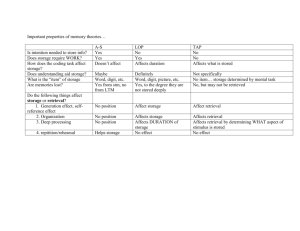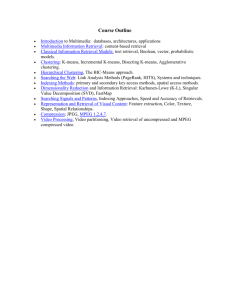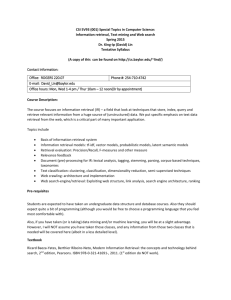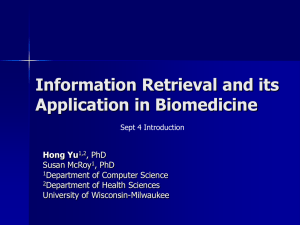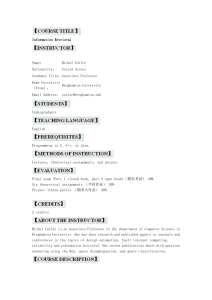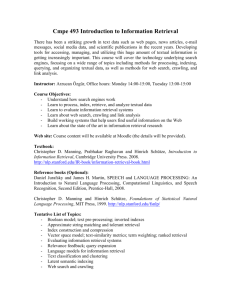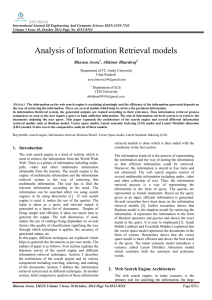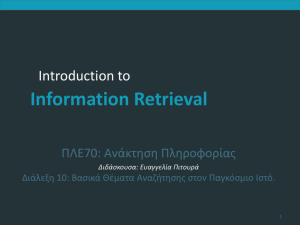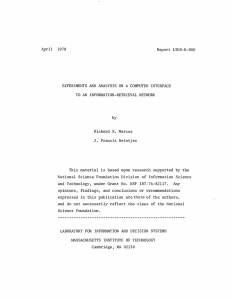BDK12-1 - Oregon Health & Science University
advertisement
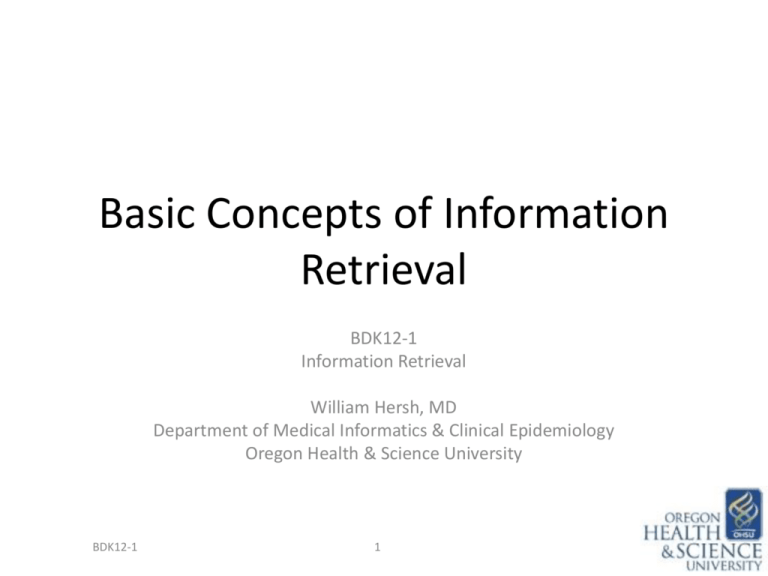
Basic Concepts of Information Retrieval BDK12-1 Information Retrieval William Hersh, MD Department of Medical Informatics & Clinical Epidemiology Oregon Health & Science University BDK12-1 1 Information retrieval (IR) • Field concerned with organization and retrieval of predominantly text-based information – Also sometimes called “search” – Multimedia (e.g., images, sounds, video, etc.) and more complex databases are increasingly a part • This module will cover – – – – – IR process and field Content Indexing Retrieval Research: evaluation and future directions BDK12-1 2 IR process and field • Overview of IR process • Field of IR • Pertinence of IR to health and biomedicine BDK12-1 3 IR system Retrieval Metadata Content Queries Search engine BDK12-1 Indexing 4 The intellectual tasks of IR • Indexing – Assigning metadata to content items – Can assign • Subjects (terms) – words, phrases from controlled vocabulary • Attributes – e.g., author, source, publication type • Retrieval – Most common approaches are • Boolean – use of AND, OR, NOT • Natural language – words common to query and content BDK12-1 5 IR also a growing part of “knowledge discovery” from scientific literature All literature Possibly relevant literature Definitely relevant literature Structured knowledge BDK12-1 6 Information retrieval Information extraction, text mining Major challenges in IR • We have gone from information paucity to information overload • Many topics we want to search on have multiple ways to be expressed – e.g., diseases, genes, symptoms, etc. • The converse is a problem too: Many words and terms used to express topics have multiple meanings • Balancing open access vs. providing for cost of production and maintenance BDK12-1 7 IR is now “mainstream” • 91% of US Internet users (73% of US adults) have used a search engine (Purcell, 2012) – 71% of Internet users (59% of US adults) have searched for health information, with 35% using it for self-diagnosis (Fox, 2013) – US users now make up only 12% of world Internet population (comScore, 2012) • “Search” is considered an “integral application” (Barrows, 2006) – Not only in libraries but also in enterprises and on individual computers and mobile devices • “Search engine optimization” (SEO) is a key function used by many companies and organizations (Google, 2010) – Many are willing to pay (Segal, 2011) – Some are lucky, e.g., last name of “Hersh” BDK12-1 8 The Web has changed the nature of search • Three major uses (Broder, 2002) – Informational – seeking information (39-48%) – Navigational – looking for a specific page, e.g., a home page (20-24%) – Transactional – perform transactions, e.g., on-line purchasing (30-36%) • We are in the era of “adversarial” search – there is content we do not want to retrieve (Castillo, 2011; Smith, 2014) • Growing privacy concerns about tracking our searching (Huesch, 2013; Libert, 2015) BDK12-1 9 IR and online access firmly planted in health and biomedicine • Biology is now defined as an “information science” (Insel, 2003) • Pharmaceutical companies compete for informatics/library talent (Davies, 2006) • Clinicians cannot keep up – average of 75 clinical trials and 11 systematic reviews published each day (Bastian, 2010) • Search for health information by clinicians, researchers, and patients/consumers is ubiquitous (Purcell, 2012; Google/Manhattan Research, 2012) – It’s even part of “meaningful use” – text search over electronic health record notes (Metzger, 2012) BDK12-1 10 Use is ubiquitous among physicians (Google/Manhattan Research, 2012) • • • • • • • • Most have multiple devices – 99% with a desktop or laptop, 84% with a smartphone, and 54% with a tablet Spend twice as much time using online resources as print resources Even physicians aged 55+ heavy users – 80% own a smartphone, 84% use search engines daily, and 9 hours per week is spent online for professional purposes Search engine use a daily activity – 84%, with average of six searches done per day and 94% using Google When looking for clinical or treatment information, about a third click first on sponsored listings from a search About 93% say they take action based on searching – everything from pursuing more information to sharing with a patient or colleague to changing treatment decisions On smartphones, searching is preferred over mobile apps – 48% of use time with a search engine, 34% with mobile apps, and 18% going to specific Web sites in a browser or with a bookmark Spend about 6 hours per week watching online video, with about half of that time spent for professional purposes BDK12-1 11 What kind of health information do consumers search for? (Fox, 2011) Health topic % searching Specific disease or medical problem 66% Certain medical treatment or procedure 56% Doctors or other health professionals 44% Hospitals or other medical facilities 36% Health insurance – private or government 33% Food safety or recalls 29% Environmental health hazards 22% Pregnancy and childbirth 19% Medical test results 16% BDK12-1 12 Why is IR pertinent to health and biomedicine? • Growth of knowledge has long surpassed human memory capabilities • Clinicians have frequent and unmet information needs • Researchers must frequently update their knowledge in new areas quickly • Primary literature on a given topic can be scattered and hard to synthesize • Non-primary literature sources are often neither comprehensive nor systematic • Web is increasingly used as source of health and biomedical information BDK12-1 13
